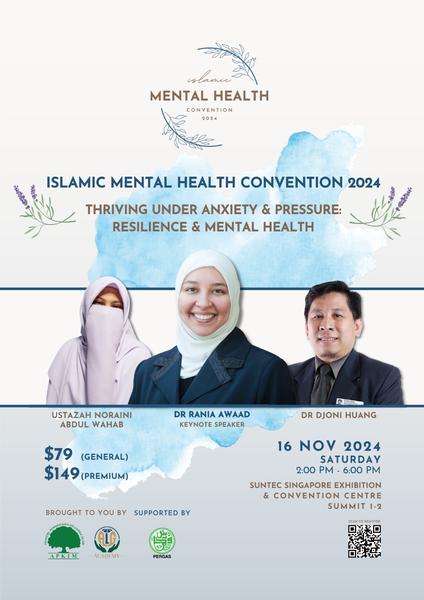Faith is often viewed as a personal journey, but its impact on mental health and resilience extends well beyond individual spirituality. Studies reveal that faith can significantly enhance mental wellness, foster resilience, and uplift overall well-being. For Muslims, this connection between spirituality and mental health isn’t only a belief—it’s grounded in both modern science and enduring Islamic
wisdom.
At the Islamic Mental Health Convention 2024, we’re gathering researchers, mental health professionals, and respected Islamic scholars to explore this powerful link between faith and mental health. Together, we’ll uncover how Islamic practices and principles can serve as pathways to mental wellness and resilience, enriched by the latest
research and insights from Islamic history. This is more than a discussion; it’s a chance to deepen our understanding and empower our community with faith-centered tools for mental health.
Here’s what you can expect to gain from this transformative event:
𝐆𝐫𝐨𝐮𝐧𝐝𝐛𝐫𝐞𝐚𝐤𝐢𝐧𝐠 𝐒𝐭𝐮𝐝𝐢𝐞𝐬 𝐚𝐧𝐝 𝐓𝐢𝐦𝐞𝐥𝐞𝐬𝐬 𝐈𝐬𝐥𝐚𝐦𝐢𝐜 𝐈𝐧𝐬𝐢𝐠𝐡𝐭𝐬
Modern research highlights the mental health benefits of spiritual practices—truths that Islam has embraced for centuries. Practices like mindfulness, prayer, and community
involvement have been shown to reduce anxiety, enhance emotional balance, and strengthen resilience. Scholars like Imam Al-Ghazali emphasized the calming power of regular prayer (salah) and reflection (muraqabah) to ground the mind and purify the heart. Islamic teachings on contemplation (tafakkur) and remembrance (dhikr) offer pathways to focus and peace, aligning seamlessly with findings in modern psychology.
𝐒𝐩𝐢𝐫𝐢𝐭𝐮𝐚𝐥 𝐑𝐞𝐬𝐢𝐥𝐢𝐞𝐧𝐜𝐞 𝐢𝐧 𝐀𝐜𝐭𝐢𝐨𝐧: 𝐀𝐩𝐩𝐥𝐲𝐢𝐧𝐠 𝐅𝐚𝐢𝐭𝐡 𝐭𝐨 𝐎𝐯𝐞𝐫𝐜𝐨𝐦𝐞 𝐂𝐡𝐚𝐥𝐥𝐞𝐧𝐠𝐞𝐬
Resilience—the ability to cope with adversity and grow stronger—is central in both mental health and Islam. Scholars like Ibn Qayyim
have deeply explored patience (sabr) and trust in Allah (tawakkul) as foundations for resilience, guiding Muslims to view challenges as part of a divine plan. This trust fosters a unique resilience, empowering individuals to persevere through life’s difficulties.
Modern research aligns with this, showing that spirituality enhances coping, reduces
stress, and aids clarity in decision-making. At our upcoming discussion, we’ll explore how spiritual resilience can transform lives, equipping parents, educators, and leaders to provide faith-centered support for those facing struggles.
𝐅𝐚𝐢𝐭𝐡-𝐂𝐞𝐧𝐭𝐞𝐫𝐞𝐝 𝐒𝐭𝐫𝐚𝐭𝐞𝐠𝐢𝐞𝐬 𝐟𝐨𝐫 𝐌𝐞𝐧𝐭𝐚𝐥 𝐚𝐧𝐝 𝐒𝐩𝐢𝐫𝐢𝐭𝐮𝐚𝐥
𝐖𝐞𝐥𝐥𝐧𝐞𝐬𝐬
Theory alone isn’t enough to effect meaningful change. At the Islamic Mental Health Convention 2024, we’re emphasizing practical, faith-based strategies that attendees can apply in their daily lives. These simple yet powerful practices can help you nurture mental resilience, grounded in the strength of Islamic teachings. For
example:
✔️ Structured Prayer Breaks: Prayer (salah) serves as a mindful pause throughout the day, allowing individuals to reset and reconnect with a higher purpose. We’ll discuss ways to use prayer as a moment to release stress and cultivate inner peace.
✔️ Gratitude Journaling: Islamic teachings emphasize gratitude (shukr) as a way to acknowledge Allah’s blessings. Incorporating gratitude into your daily routine not only strengthens faith but has also been shown to improve mental well-being by shifting focus from stress to positive experiences.
✔️ Mindful Reflection and Dhikr: Incorporating regular moments of reflection and remembrance (dhikr) helps to steady the mind and bring calmness. These practices allow Muslims to quiet the mind, focus on the present, and draw closer to Allah—creating a spiritual sanctuary that enhances mental wellness.
✔️ Community Engagement:
Islam places high value on community (ummah) and social support. Being actively involved with others strengthens social bonds, reduces loneliness, and provides a network of support for individuals facing mental health challenges. Building a supportive environment within the community can make a profound difference for those who feel isolated.
𝐓𝐡𝐞 𝐏𝐨𝐰𝐞𝐫 𝐨𝐟 𝐂𝐨𝐦𝐦𝐮𝐧𝐢𝐭𝐲 𝐢𝐧 𝐌𝐞𝐧𝐭𝐚𝐥 𝐖𝐞𝐥𝐥𝐧𝐞𝐬𝐬
Our faith teaches us that believers are like a single body—when one part is in pain, the whole body feels it. This interconnectedness speaks to the immense role a supportive community can play in mental health. Imagine a community that not only accepts but actively
supports individuals facing mental health challenges, responding with compassion rather than judgment. By cultivating a compassionate and understanding environment, we ensure that no one has to carry their burdens alone. During the convention, we’ll explore how communities can create safe, non-judgmental spaces where mental health struggles are met with empathy and understanding. You’ll learn how to foster a culture of support within your own networks, whether you’re a parent, educator,
religious leader, or mental health professional.
𝐉𝐨𝐢𝐧 𝐔𝐬 𝐟𝐨𝐫 𝐚 𝐅𝐚𝐢𝐭𝐡-𝐁𝐚𝐬𝐞𝐝 𝐀𝐩𝐩𝐫𝐨𝐚𝐜𝐡 𝐭𝐨 𝐌𝐞𝐧𝐭𝐚𝐥 𝐇𝐞𝐚𝐥𝐭𝐡 𝐚𝐧𝐝 𝐑𝐞𝐬𝐢𝐥𝐢𝐞𝐧𝐜𝐞
The Islamic Mental Health Convention 2024 is more than an event—it’s a movement toward a future where mental health is embraced with the same compassion, understanding, and strength that define our faith. This is an opportunity to connect, learn, and equip yourself with tools that can transform not only your own life but also those around you.


